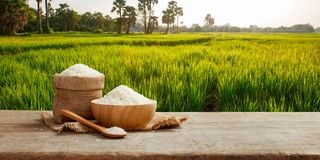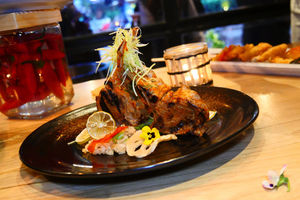
African diplomats in Bangkok are demanding answers from local authorities after officials decided to ship ten-year-old rice to Africa.
African diplomats in Bangkok are demanding answers from local authorities after officials decided to ship ten-year-old rice to Africa, ostensibly to recoup storage costs on grain.
The decision, vehemently supported by Thai government officials, has sparked fears among the African diplomats in Bangkok, who have questioned why the bulk sale is being targeted at Africa rather than local markets. They have raised concerns about the safety of the grain.
On Monday, the diplomats jointly took their concerns to the local Foreign Ministry but received no direct response. Instead, an official there promised to consult, according to the envoys who spoke to the Nation on background.
“Today, (Tuesday) we the African Ambassadors Group met MFA officials to express our concern regarding the singling of Africa to sell the old rice to. Why Africa?” posed one African diplomat.
Controversial grain
“To us, this smacks of racism against African people. The MFA will be seeking clarification from the Ministry of Commerce as soon as possible,” added another. They both asked to remain anonymous so as not to jeopardise the discussions on the nature of exports.
The controversial grain is a result of a corrupt government policy in 2011 when then-Thai Prime Minister Yingluck Shinawatra implemented what is known as the rice-pledging scheme for farmers. Growers were asked to pledge tonnage to authorities after which they could hedge a price higher than if they sold independently.
But it cost Thai taxpayers some 500 billion Thai baht ($13.7 billion, Sh1.8 trillion) largely because it allowed avenues for misappropriation of funds and encouraged overproduction that made it uncompetitive on the world stage.
The Thai Ministry of Commerce has been trying to reassure the public that the rice is safe.
Appearing in one stunt, Thai Deputy Prime Minister and Minister for Commerce Phumtham Wechayachai tasted a bowl of rice before a barrage of cameras and claimed the rice had been sampled from a warehouse where the bulk had been stored for over ten years.
On Tuesday, he told local media that the government would auction the rice to Africa next month with a committee set up to oversee the process.
Lab tests
According to the Bangkok Post, Mr Phumtham Wechayachai declared the rice safe, banking on lab tests reportedly commissioned by a local media outlet.
Thailand intends to sell up to 15,000 tonnes “or even export it to Africa with the goal of fetching 270 million baht ($7.4 million, Sh977 million) and saving the rice storage budget,” the paper reported on Monday. Mr Phumtham described critics of the policy as “fanciful” and “unscientific,” according to a follow-up editorial in the Bangkok Post.
On Tuesday, Thai Public Health Minister Somsak Thepsutin told local media that the priority of the government would be to save its losses.
“Transparency or not, is this how we judge it? You should focus on whether the rice can fetch a good price. The issue should be put to rest if it is sold at a good price,” he said.
But even local critics were questioning whether the samples allegedly approved for consumption had indeed been from the warehouses where the ten-year-old rice is situated. A local consumer rights lobby was reportedly denied access to a sample it wanted to send to an independent lab.
The African diplomats argue the decision is worrying because Thailand is one of the biggest exporters of rice to Africa, selling to countries like Kenya, Nigeria and South Africa in bulk.
In 2022, for example, Kenya bought about $10.4 million worth of Thai rice, according to the UN Comtrade figures. Other sources for its overall $317 million rice imports included Pakistan ($135 million), India ($130 million), Tanzania ($28.5 million), and South Korea ($10.8 million).
There was no indication any of the Thai rice already imported into Kenya had safety concerns. A spokesperson at the Kenya Bureau of Standards had promised to provide an update related to future imports but had not done so by the time went to press.
Across the continent, Thai rice is most consumed in South Africa, Senegal, Cameroon, Mozambique, and Côte d'Ivoire imported 2.48 million tons in 2023, of the 4.6 million tonnes exported to Africa, according to the Thai Rice Exporters Association.
Other countries like Zimbabwe (55,691 tons), Algeria (76,747 tons), Angola (135,909 tons), Benin (139,206 tons), and Togo (145,098 tons) also purchased rice from Thailand. Some of these countries have strengthened rice trade relations by having Thai firms opening branches on their territories.
With Africa’s rice consumption expected to reach 40 million tons by next year, Thailand, the US, Vietnam, India, and Pakistan could continue to jostle for the $35 billion import bill in Africa.
Yingluck was in 2017 found guilty, in absentia of “dereliction of duty” in this scheme. But she had since gained a second nationality in Europe. Now her Pheu Thai party wants to recoup the money the rice couldn’t deliver, by selling it to Africa.








